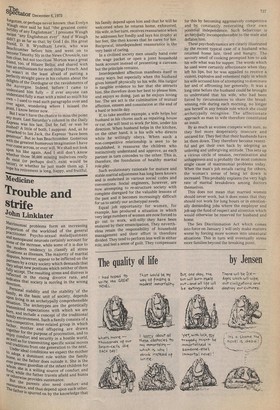Medicine
Trouble and strife
John Linklater Matrimonial problems form an increasing ProPortion of the workload of the general Practitioner. Psycho-sexual maladjustment and Menopausal neurosis certainly account for si3.,Ine of the increase, while some of it is due to "1. e Modern tendency to classify all stress situations as illnesses. The majority of marital chsPutes, however, appear to be inflicted on the
ertners by a crazy society which demands that
eY adopt new positions which neither of them i :u11Y accept. The resulting stress and distress s 'reflected in the rising divorce rate, and n .dicates that society is moving in the wrong threction. f Pe.rsonal stability and the stability of the 1131, as the basic unit of society, depends supon living in an archetypally comprehensible tituar, The archetypes are the genetically jansmitted expectations with which we are and include a concept of the traditional II rally environment. Such a family consists of a f °II-competitive, inter-related group in which .aother, mother and offspring are drawn gether for the purpose of procreation, and to asnJoY comfort and security in a hostile world, as for
'n transmitting specific social moves 9 traditions Under ideal from one generation to the next. to conditions we expect the mother
h adoPt a dominant role within the family e _verrie, as the father does outside it. She is the wher-present guardian of the infant children for fo,"1 she is a willing source of comfort and or Othe While the father travels afield and hunts
provides sustenance.
r_dut the parents also need comfort and ce, and thus depend upon each other. The father i s spurred on by the knowledge that
his family depend upon him and that he will be welcomed when he returns home, exhausted. His wife, in her turn, receives reassurance when he addresses her fondly and lays his trophy at her feet. She then knows that he cares for her. Reciprocal, interdependent reassurance is the very basis of caring. In a civilised society men usually hand over the wage packet or open a joint household bank account instead of presenting a carcase, but the principle remains. Interdependent affection manifests itself in many ways, but especially when the husband gives himself physically to his wife. His turgor is tangible evidence to her that she attracts him. She therefore does her best to please him, and enjoys so doing, just as he enjoys loving her. The sex act is the culmination of mutual affection, esteem and consolation at the end of a hard or hostile day.
If, to take another example, a wife helps her husband in his chores such as repairing house or car, she will tend to work for him, under his direction. When husband helps in the kitchen, on the other hand, it is his wife who directs while he willingly obeys. When such a non-competitive relationship is seen to be established, it reassures the children who instinctively understand and approve, as each partner in turn concedes to the other. This is, therefore, the foundation of healthy marital
role play. Such evolutionary rationale for mature and stable marital adjustment has long been known and is enshrined in various social codes and conventions. Social engineers, however, are now attempting to re-structure society with complete disregard for the valuable lessons of the past and it becomes increasingly difficult for us to satisfy our archetypal needs. Equal job opportunity for women, for example, has produced a situation in which very large numbers of women are now forced to go out to work, will-nilly: they have been enslaved by their emancipation. They nevertheless retain the responsibility of household management and their effort is therefore divided. They tend to perform less well in either role, and feel a sense of guilt. They compensate for this by becoming aggressively competitive and by constantly reiterating their own potential independence. Such behaviour is archetypally incomprehensible to the male and deflates him.
These psychodynamics are clearly illustrated by the recent typical case of a husband who returned home late, tired and hungry. The savoury smell of cooking prompted him to ask his wife what was for supper. The words which he used were certainly affectionate when they left his lips, but he was appalled to receive a violent, explosive and vehement reply in which his wife accused him of attempting to dominate her and of affronting her generally. It was a long time before the husband could be brought to understand that his wife, who had been forced by circumstances to share the breadwinning role during each morning, no longer saw herself in any female role which she could archetypally recognise. The affectionate approach as man to wife therefore constituted an insult.
By as much as women compete with men, so they feel more desperately insecure and uncared for. They feel that their husbands have let them down. They therefore become resentful and get their own back by adopting an unloving and unforgiving attitude. This sets up a vicious circle of tension, recrimination and unhappiness and is probably the most common single cause of matrimonial problems today. When the man's job entails caring for others, the woman's sense of being let down is increased. This probably explains the very high rate of marital breakdown among doctors themselves.
This does not mean that married women should never work, but it does mean that they should not work for long hours or in emotionally demanding jobs where the employer and job sap the fund of respect and attention which would otherwise be reserved for husband and home.
The Sex Discrimination Act which comes into force on January I will only make matters worse by forcing more women into unnatural situations. This in turn will eventually stress more families beyond the breaking point.

































 Previous page
Previous page